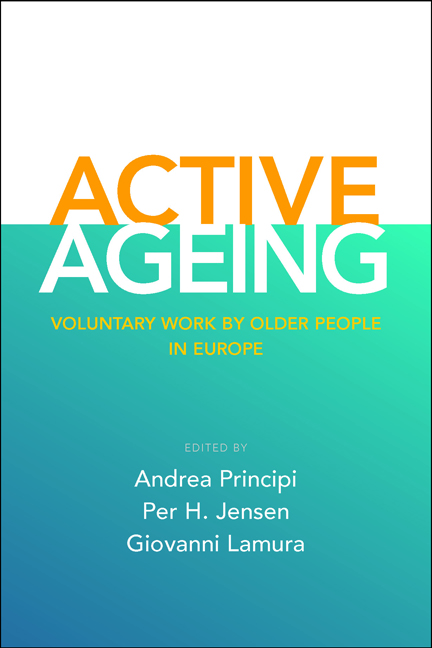Book contents
- Frontmatter
- Contents
- List of tables and figures
- Notes on the contributors
- Acknowledgements
- Foreword
- Part I Realising volunteering by older people in Europe An overarching approach
- Part II Opportunities and restrictions for older volunteers National experiences
- Part III Opportunities and restrictions for older volunteers Case studies in European voluntary organisations
- Part IV Conclusions
- Index
one - Introduction: enhancing volunteering in later life in Europe
Published online by Cambridge University Press: 05 March 2022
- Frontmatter
- Contents
- List of tables and figures
- Notes on the contributors
- Acknowledgements
- Foreword
- Part I Realising volunteering by older people in Europe An overarching approach
- Part II Opportunities and restrictions for older volunteers National experiences
- Part III Opportunities and restrictions for older volunteers Case studies in European voluntary organisations
- Part IV Conclusions
- Index
Summary
Introduction
‘Active ageing’ is a relatively new concept formulated in the 1990s on the basis of work carried out by the World Health Organization (WHO) and subsequently adopted by the European Union (EU) (Walker and Maltby, 2012). Use of this concept has become pervasive, especially in the EU, as a response to the ageing of the population, and to some degree as a result of shifts in the economic and demographic prospects for the future. The idea and concept of active ageing bears some resemblance to the concept of ‘active society’, that is, a society in which participation in paid employment is the norm for most social groups (Walters, 1997; Jensen and Pfau-Effinger, 2005). The emergence of such ideas and concepts represents a shift from a more passive to a more active citizenship, where paid work is the main route to social inclusion, and where individuals are expected to be autonomous, self-reliant, self-responsible, flexible and able to create their biography individually, continuously adapting to changing external conditions with the consequent individualisation of social risks (Beck, 1986; Sennett, 1998; Esping-Andersen et al, 2002).
The concepts of active ageing and active society, however, are not synonymous. Thus, from the perspective of an active society, the focus in relation to demographic change would be on increasing the employment rates of older workers through pension reforms that promote late exit from the labour market (cf Ebbinghaus, 2006, 2011; Immergut et al, 2007; Hofacker, 2010; Palier, 2010). By contrast, active ageing is a broader concept, referring to a society where older adults are expected to be active beyond their participation in the labour market (Walker, 2002, 2006). In this sense, it is not solely about making older people work longer in paid employment, but also about a society with active older adults. The meaning of active ageing, as a concept that somehow extends beyond the labour market, is clear from the comprehensive definition of active ageing suggested by WHO, according to which it can be defined as a process ‘of optimising opportunities for health, participation and security in order to enhance quality of life as people age’ (WHO, 2002, p 12). This definition emphasises good health, participation and inclusion of older people in the social, economic, cultural, spiritual and civic areas of life.
- Type
- Chapter
- Information
- Active AgeingVoluntary Work by Older People in Europe, pp. 3 - 20Publisher: Bristol University PressPrint publication year: 2014



